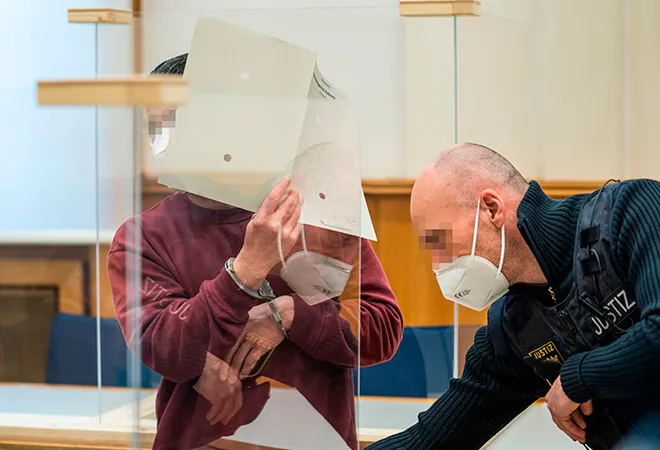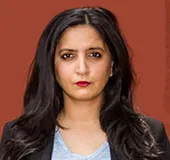
In a historic judgment last month, Germany’s regional court in Koblenz convicted one of the two former Syrian secret police officers in a trial on war crimes outside Syria and outside the International Criminal Court.
Eyad al-Gharib arrested and transported protestors to Al-Khatib detention and interrogation centre in 2011 — the beginning of the Syrian uprising — even though he was aware that they would be tortured. He has been sentenced to four and a half years in prison for aiding and abetting crimes against humanity.
Piles of evidence were presented to the court during the trial, named after one of the detention centres where torture was committed, to establish the chain of command.
The conviction is based on Eyad’s confession but according to human rights lawyers, it proves that illegal detentions, torture, and forced disappearances were carried out in a systematic way under the Assad government.
Piles of evidence were presented to the court during the trial, named after one of the detention centres where torture was committed, to establish the chain of command. The evidence included: Tens of thousands of photographs of corpses — with evident marks of torture — smuggled out by a military police photographer code-named Caesar, as well as several testimonies.
Since Russia and China vetoed all attempts to try the case against the higher-echelons of the Syrian regime at the International Criminal Court, Germany decided to step in.
The European Center for Constitutional and Human Rights (ECCHR), which supports Syrian torture survivors who are joint plaintiffs in the proceedings, welcomed the judgment. “This is the first time a former member of the Syrian intelligence services has been convicted of a crime under international law,”
said the ECCHR in a statement. “The trial of the main defendant, Anwar R, will continue until at least October 2021.”
Anwar Raslan, Eyad’s senior, is being tried for overseeing the torture of 4,000 people at Al-Khatib. Raslan was in charge of the infamous detention centre in Damascus at the height of the protests in Syria.
Since Russia and China vetoed all attempts to try the case against the higher-echelons of the Syrian regime at the International Criminal Court, Germany decided to step in. It exercised the principle of universal jurisdiction under which it can try foreigners for war crimes. It is being applauded for taking the initiative and sending a message to dictators and authoritarian regimes that they cannot carry on committing such crimes with impunity.
On 1 March, the United Nations also released a report that tens of thousands of civilians were arbitrarily detained and disappeared during the decade-long conflict.
“Testimony by torture survivors and intelligence officers, as well as the Caesar photos prove the scale and systemic nature of enforced disappearances, torture, and sexual violence in Syria,”
said Patrick Kroker who represents joint plaintiffs in Anwar Raslan’s case. “The relevance of this evidence extends far beyond the proceedings in Koblenz.”
Human rights lawyers and legal activists hope that the testimonies and evidence presented to the court in the Al-Khatib trial can be used in other proceedings against the Syrian government officials in future cases. They also hope that the verdict will provide closure to at least some of the victims of crimes in Syria and encourage other European prosecutors to initiate similar proceedings.
On 1 March, the United Nations also released a report that tens of thousands of civilians were arbitrarily detained and disappeared during the decade-long conflict. It acknowledged that the international system had failed to provide justice and emphasised the significance of the principle of universal jurisdiction in such cases.
The UN asked for the release of an estimated 100,000 detainees in Syrian prisons and said that until they were freed, a political solution to the Syrian crisis was out of the question.
Whilst the UN report accused other warring parties of committing grave crimes too, the focus of the 30-page document — based on over 2,500 interviews with victims and witnesses conducted over the last decade — was on excesses committed by the Syrian government.
“Pro-government forces, but also other warring parties, resorted to methods of waging war and used weaponry that minimised risks to their fighters, rather than those minimising harm to civilians,”
the report said. “They consistently focused on the acquisition and control of territory, at the expense of the rights of the civilian population. Syrians have suffered vast aerial bombardments of densely populated areas; they have endured chemical weapons attacks and modern day sieges in which perpetrators deliberately starved the population along medieval scripts, and indefensible and shameful restrictions on humanitarian aid — both cross-line and cross-border, the latter even with the approval of the Security Council.”
Some are still pessimistic and say that a couple of such convictions will do little to change the government’s behaviour.
The UN asked for the release of an estimated 100,000 detainees in Syrian prisons and said that until they were freed, a political solution to the Syrian crisis was out of the question.
The Syrian government denies all accusations. Experts, however, say that releasing detainees is suicidal for the government as that would prove the government’s alleged crimes.
Some are celebrating the Koblenz verdict but many others are still pessimistic and say that a couple of such convictions will do little to change the government’s behaviour.
The views expressed above belong to the author(s). ORF research and analyses now available on Telegram! Click here to access our curated content — blogs, longforms and interviews.



 In a historic judgment last month, Germany’s regional court in Koblenz convicted one of the two former Syrian secret police officers in a trial on war crimes outside Syria and outside the International Criminal Court.
Eyad al-Gharib arrested and transported protestors to Al-Khatib detention and interrogation centre in 2011 — the beginning of the Syrian uprising — even though he was aware that they would be tortured. He has been sentenced to four and a half years in prison for aiding and abetting crimes against humanity.
In a historic judgment last month, Germany’s regional court in Koblenz convicted one of the two former Syrian secret police officers in a trial on war crimes outside Syria and outside the International Criminal Court.
Eyad al-Gharib arrested and transported protestors to Al-Khatib detention and interrogation centre in 2011 — the beginning of the Syrian uprising — even though he was aware that they would be tortured. He has been sentenced to four and a half years in prison for aiding and abetting crimes against humanity.
 PREV
PREV


